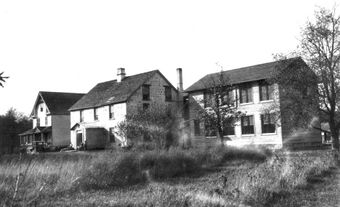Medicine, General Practice
General practice is the branch of medicine concerned with providing care (known as "primary and continuing care") to patients irrespective of their age, sex or type of problem. In Canada general practice is also known as "family practice" and general practitioners are also known as "family physicians." General practice as a medical discipline is usually referred to as Family Medicine.
A number of features make general practice a distinctive part of the medical profession. General practitioners (GPs) usually enter into a long-term relationship with their patients which enables the physician to treat illness with a full knowledge of a patient's life history, medical history, social and family relationships, and personal values or preferences. GPs see each of their patients on the average 4 times a year. These visits provide excellent opportunities for health education and the early detection of disease. The majority of illness episodes are managed entirely by the GP.
When specialized help is needed, the GP arranges a consultation with or a referral to the appropriate specialist. The growth of specialization and the technological development of medicine have added greatly to the complexity of medical care; GPs are often instrumental in co-ordinating the patient's care and in explaining the implications of diagnostic investigations to patients and their families.
When GPs live in the communities in which they practise, particularly rural communities, they can gain valuable knowledge of the working and living environments of their patients. Some GPs still visit their patients at home and the great majority of general practitioners in Canada admit and care for their own patients in hospital. Prenatal, postnatal and well-baby care are important parts of this kind of medicine.
The Development of General Practice
In the 19th and early 20th centuries, virtually all doctors were GPs. Since the 1930s there has been an enormous growth in the number of major medical specialties, and since the 1950s, a great deal of fragmentation into subspecialties. As a result, certain procedures (eg, major surgery) which were formerly the responsibility of GPs have increasingly become the province of full-time specialists. At the same time, many specialists, by limiting their practice to narrower fields, can no longer provide primary care. In some specialties, however (notably pediatrics and obstetrics), there are practitioners who offer primary and continuing care to certain age groups.
The rapid growth of specialization after WWII was followed by a decline in the numbers of GPs, a decline paralleled in other countries and in other professions, where the relationship between generalists and specialists became an issue. Since that time, however, a number of factors have contributed to a renaissance of general practice, including the founding in 1954 of the College of General Practitioners, renamed in 1967 the College of Family Physicians. The college has provided the intellectual and academic leadership that has enabled GPs to redefine their role in a more complex society. Instead of seeing themselves as "jacks of all trades," GPs are now members of a well-defined medical discipline, based on an integrated knowledge of clinical medicine and human behaviour, with special skills in the prevention and early diagnosis of disease and the complex long-term care of patients.
The college has encouraged the emergence of general practice as an academic discipline in the universities and the development of postgraduate training programs in family medicine. The first chair of family medicine was established at University of Western Ontario in 1968; today all 16 medical schools in Canada have academic units of general practice and postgraduate training programs. Several hundred trainees graduate from these programs each year. The College of Family Physicians, which was founded in 1954, has approximately 13 000 members, each of whom also has compulsory membership in their provincial colleges.
In 1997 there were 28 108 GPs and 27 135 specialists in Canada. A historic problem with insufficient training positions for all graduates entering general practice generally has been overcome and there is increased awareness of the GP's role in the large urban hospital. General practice has become a popular career choice for medical graduates, especially women graduates.
The growing proportion of elderly people in the population has made the care of the aged an increasingly important aspect of general practice, and the high cost of hospital care and the complexity and fragmentation of medicine has made it essential to have a well-trained and highly skilled body of generalists.

 Share on Facebook
Share on Facebook Share on X
Share on X Share by Email
Share by Email Share on Google Classroom
Share on Google Classroom


